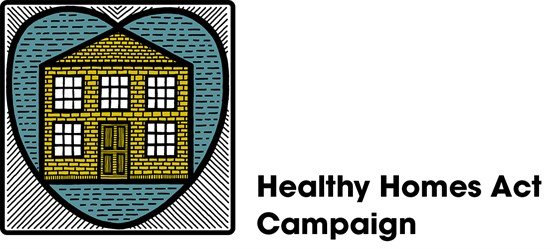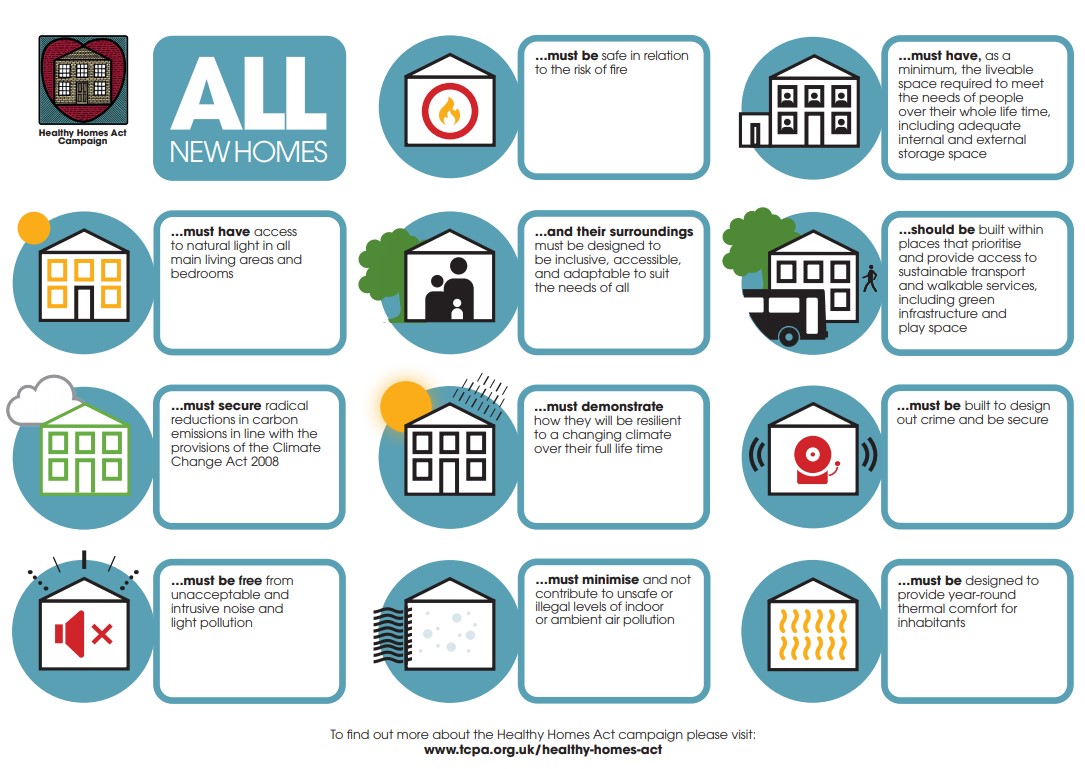Healthy Homes Act
Contents |
[edit] Introduction
The Town and Country Planning Association (TCPA) campaigns for reform of the UK’s planning system to make it more responsive to people’s needs and aspirations and to promote sustainable development.
In May 2019, TCPA introduced the Healthy Homes Bill - a campaign for legislation for the transformation of the quality of new homes in England.
[edit] Background
This measure came in response to research the TCPA undertook with University College London (UCL), which in one case study found that, using permitted development rights, a developer had increased the number of flats in a building by 33% above what was declared within their ‘prior approval’ application. This precedent was seen as potentially leading to overcrowding while preventing the local authority from planning to meet the needs of residents. In another example, researchers discovered a two-bed flat, again built using permitted development, having only one small window.
When the Bill was introduced, Fiona Howie, chief executive of the TCPA, explained that the very worst examples of unacceptable housing, “...have come through the deregulated conversion of old office blocks and storage facilities into housing units. The creation of these cramped and substandard housing units is even more scandalous, given what we know about the impact of housing conditions on people’s health and wellbeing. Poor quality, badly designed housing damages people’s life chances.”
The announcement of the proposed Act coincided with the centenary of the Housing and Town Planning Act 1919, a key piece of legislation that helped transform the quality and delivery of council housing, giving ordinary people a decent home.
Howie said, “We have gone backwards over the last 100 years. The Healthy Homes Act will help make sure that new homes built today leave a positive legacy.”
[edit] 10 healthy principles
The purpose of the proposal is to make ministers aware of proactive measures that should be taken for all new housing to meet 10 basic quality, safety and placemaking principles that collectively constitute the minimum standard for ‘decent’ homes.
According to the 10 principles, all new homes must:
- Be safe in relation to the risk of fire.
- Have adequate liveable space.
- Have access to natural light for all main living areas and bedrooms.
- Be accessible and have environments with access to natural light.
- Be within walkable neighbourhoods (if within major developments).
- Secure radical reductions in carbon emissions in line with the provisions of the Climate Change Act (2008).
- Have walkable access to green and play space which is open to everyone.
- Be resilient to a changing climate.
- Be secure and meet designing out crime standards.
- Meet enhanced standards to prevent unacceptable noise pollution.
[edit] Supporting the campaign
At the core of the proposal is an ongoing research project funded by the Nationwide Foundation and supported by several businesses, charities and other organisations.
Ref https://www.tcpa.org.uk/healthy-homes-act
[edit] Related articles on Designing Buildings Wiki
- Affordable housing.
- Building for life.
- Housing standards review.
- Lyons Housing Review.
- Raynsford Review.
- The full cost of poor housing.
- The future of housing.
- Town and Country Planning Association TCPA.
[edit] External resources
- TCPA, Healthy Homes Act.
Featured articles and news
Construction Skills Mission Board launch sector drive
Newly formed government and industry collaboration set strategy for recruiting an additional 100,000 construction workers a year.
New Architects Code comes into effect in September 2025
ARB Architects Code of Conduct and Practice available with ongoing consultation regarding guidance.
Welsh Skills Body (Medr) launches ambitious plan
The new skills body brings together funding and regulation of tertiary education and research for the devolved nation.
Paul Gandy FCIOB announced as next CIOB President
Former Tilbury Douglas CEO takes helm.
UK Infrastructure: A 10 Year Strategy. In brief with reactions
With the National Infrastructure and Service Transformation Authority (NISTA).
Ebenezer Howard: inventor of the garden city. Book review.
The Grenfell Tower fire, eight years on
A time to pause and reflect as Dubai tower block fire reported just before anniversary.
Airtightness Topic Guide BSRIA TG 27/2025
Explaining the basics of airtightness, what it is, why it's important, when it's required and how it's carried out.
Construction contract awards hit lowest point of 2025
Plummeting for second consecutive month, intensifying concerns for housing and infrastructure goals.
Understanding Mental Health in the Built Environment 2025
Examining the state of mental health in construction, shedding light on levels of stress, anxiety and depression.
The benefits of engaging with insulation manufacturers
When considering ground floor constructions.
Lighting Industry endorses Blueprint for Electrification
The Lighting Industry Association fully supports the ECA Blueprint as a timely, urgent call to action.
BSRIA Sentinel Clerk of Works Training Case Study
Strengthening expertise to enhance service delivery with integrated cutting-edge industry knowledge.
Impact report from the Supply Chain Sustainability School
Free sustainability skills, training and support delivered to thousands of UK companies to help cut carbon.
The Building Safety Forum at the Installershow 2025
With speakers confirmed for 24 June as part of Building Safety Week.
The UK’s largest air pollution campaign.
Future Homes Standard, now includes solar, but what else?
Will the new standard, due to in the Autumn, go far enough in terms of performance ?
BSRIA Briefing: Cleaner Air, Better tomorrow
A look back at issues relating to inside and outside air quality, discussed during the BSRIA briefing in 2023.
Restoring Abbotsford's hothouse
Bringing the writer Walter Scott's garden to life.
Reflections on the spending review with CIAT.



























